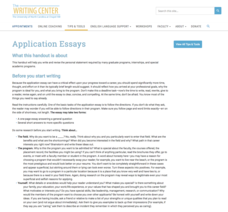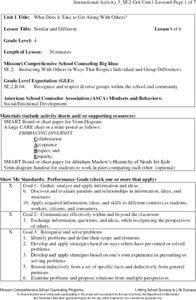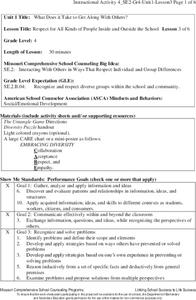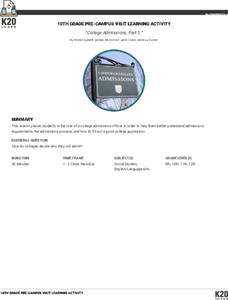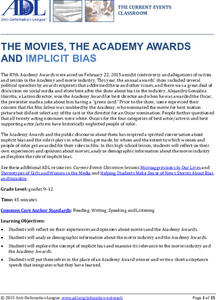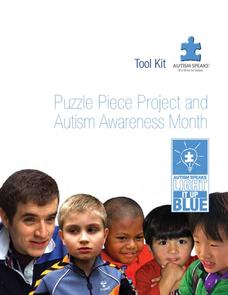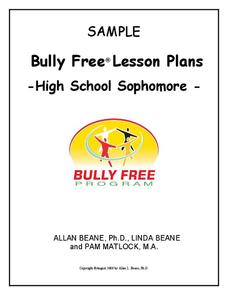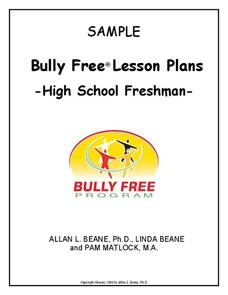Curated OER
Promoting Disability Awareness and Acceptance in Childhood
Create a safe and respectful school environment with the help of this special education teaching guide. Offering dozens of instructional ideas and activities for raising awareness and acceptance of children with disabilities, this is a...
Literacy Design Collaborative
Elie Wiesel's Acceptance Speech Analysis
Elie Wiesel's Nobel Prize Acceptance speech provides young historians with an opportunity to demonstrate their ability to use evidence from the speech. They work together to analyze how Wiesel uses rhetorical devices and syntax to...
Learning for Life
Race, Religion, and Culture
Accepting others as individuals regardless of differences in appearances, languages, and interests is an important life skill for youngsters to acquire. The activities provided in this resource will support learners as they explore the...
National Endowment for the Humanities
García Márquez’s Nobel Prize Speech: “The Solitude of Latin America”
To conclude a study of One Hundred Years of Solitude, class members analyze Gabriel Garcia Marquez's Nobel Prize in Literature acceptance speech. After a whole-class discussion of the main ideas in the speech, individuals draft a...
Radford University
Big Future - How SAT Scores Play a Role in College Acceptance
Understanding the importance of SAT scores is as easy as ABC. A set of three statistics lessons teaches scholars about normal distributions, the Empirical Rule, and z-scores. They apply their newfound knowledge to investigate data...
Equality and Human Rights Commission
Identity
Is identity defined by genes, cultural standards, personal feelings, a combination of these, or something else altogether? Scholars learn about the complex topic of identity with a presentation, a game, and with a series of discussions....
University of New Mexico
Educating Culturally and Linguistically Diverse Students
Three mini units make up one large unit designed to explore multiculturalism and encourage cultural identity. Each lesson sparks thoughtful discussion, critical thinking, and are equipped with activities and assignments geared to...
Missouri Department of Elementary
A Stranger Among Us
The final lesson in the R.E.S.PE.C.T series asks eighth graders to expand their vision beyond the walls of the classroom and to consider how they can promote acceptance and respect of others within in the global community. "A Stranger...
University of North Carolina
Application Essays
There's a lot riding on good writing! Often, an application essay is the difference between acceptance and rejection. As part of a series on specific writing assignments and contexts, a handout helps scholars craft the perfect personal...
Curated OER
Prejudice and Discrimination
How do we break the habit of prejudice? The activities in this packet are designed to promote awareness, harmony, and acceptance. Participants identify their stereotypic beliefs, attitudes, and behaviors, reflect to discover the sources...
Missouri Department of Elementary
Similar and Different
Using a Venn diagram, pupils compare the similarities and differences between two classmates. Next, they review the CARE acronym (Collaboration, Acceptance, Respect, Empathy) and discuss how it applies to diversity in the classroom.
Missouri Department of Elementary
Respect for All Kinds of People Inside and Outside the School
Why is it important to embrace diversity? Scholars explore the topic by learning about the CARE acronym: Collaboration, Acceptance, Respect, Empathy. They also complete a diversity puzzle worksheet and play a collaborative game that...
PBS
Stereotypes vs. Statistics (Grades 4-8)
Stereotypes can be painful if they are used to discriminate against others. Statistics, however, can be helpful in dispelling myths propagated by stereotypes. Using a thoughtful lesson plan, scholars complete graphic organizers and...
K20 LEARN
College Admissions, Part 1: 10th Grade Pre-Campus Visit Learning Activity
Scholars assume the role of admissions officers to better understand the college admissions process. They evaluate five fictional college applications and work together to determine which ones meet acceptance requirements.
Facing History and Ourselves
The Costs and Benefits of Belonging
Peer pressure and the desire for acceptance are powerful things. A thought-provoking lesson plan looks at the positive and negative effects of wanting to belong to a group. Class members examine the roles of the perpetrator, the victim,...
Anti-Defamation League
The Movies, the Academy Awards and Implicit Bias
"And the award goes to. . . " High schoolers investigate bias in the movie industry by reading articles, watching a short video, and examining data about the Academy of Motion Picture Arts and Sciences (AMPAS) membership, nominees, and...
Macmillan Education
Respect Others
R E S P E C T, kids find out what it means with this lesson that's got both worksheets and exercises.
Autism Speaks
Puzzle Piece Project and Autism Awareness Month
Looking for ways to include your class members in Autism Awareness Month? Use a packet that provides several opportunities to include the student body in an important campaign.
Community Colleges of Los Angeles
Seeking Refuge: Understanding Refugees in Canada
What if you had no choice but to leave everything behind and seek asylum elsewhere? Do countries have an obligation to accept refugees? To gain an understanding of the complexity of the issues of refugee rights, class members first...
Sharp School
Horror Fiction Multimedia Project
"There comes an end to all things" and ending a study of horror fiction with a multimedia project is "like starting a stone. . . away the stone goes, starting others. . ." In this case, groups start with a question generated by Dr....
Bully Free Systems
Bully Free Lesson Plans—10th Grade
Two lessons, "What Does Cyber Bullying Look Like?" and "Factors Influencing My Reporting the Bullying of Others," serve as examples of the 12 included in a Bully Free curriculum. Each plan includes discussion questions, an activity, and...
Bully Free Systems
Bully Free Lesson Plans—Ninth Grade
"Bullying and Prejudice" and "Do You Cyber Bully," two lessons from a complete Bully Free program, serve as samples of the approach used in a unit designed to bring awareness to and to combat bullying. Each lesson asks class members to...
Library Sparks
Bridge to Terabithia: Library Lessons
Foreshadowing, flashbacks, and imaginary places are the three topics of focus in this two-lesson plan packet written especially for the book, Bridge to Terabithia. Each lesson plan also comes with worksheets and activities to support...
University of North Carolina
Latin Terms and Abbreviations
N.B.. cit., n.b., viz., sc., inf. e,g,—these abbreviations frequently appear in academic papers and on works cited lists, but what do they mean? Part of a larger series to improve writing skills, the handout on Latin terms and...










